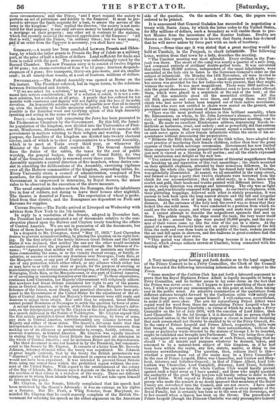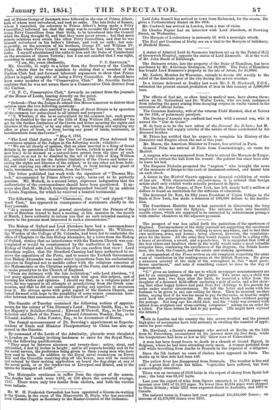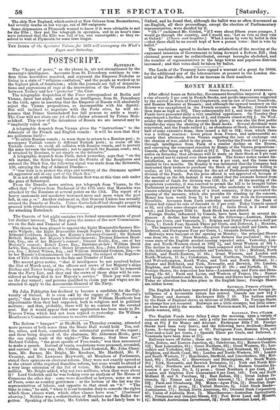3jigrrIlautuul
A Tory morning print having put forth doubts as to tho legal capacity of the Prince Consort to be a Privy Councillor, the Clerk of the Council has forwarded the following interesting information on the subject to the Times.
" Some member of the Carlton Club has put forth a laboured argument to prove that his Royal Highness Prince Albert is legally incapable of being a Privy Councillor, and he further seems to lay some stress on the fact that the Prince was never sworn. As I happen to know something of these mat- ters, I wish to prevent any misconception, on this point at least, from taking root in the public mind. An attentive examination of the quotations from different statutes brought forward by the Carltonian critic will■ satisfy any one that they prove the case against himself. I will endeavour, nevertheless, to make it still more clear. The acts for naturalizing Prince Albert were copied word for word from those for naturalizing Prince Leopold when he married the late Princess Charlotte ; in virtue of which he was made a Privy Councillor on the 1st of July 1816, with the sanction of Lord Eldon, then Lord Chancellor. By the 1st George I. it is directed that no person shall be naturalized unless in the bill for that purpose a clause is inserted declaring that such person shall not thereby be enabled to be of the Privy Council, &e: In the cases of Prince Leopold and Prince Albert, respectively, bills were first brought in, enacting that acts for their naturalization, without the clause or particular words directed by the statute of George I. to be inserted, might be exhibited and brought into Parliament. The way being thus clear- ed, subsequent acts were passed in the case of each Prince, enacting that he should ' to all intents and purposes whatever be deemed,'' taken, and esteemed to be a natural-born subject of this kingdom, as if he had been born within the realm, any law, statute, matter, or thing to the contrary notwithstanding.' The question, then, reduces itself to this— whether a person born out of the realm may be a Privy Councillor I In the case of Prince Leopold, Eldon was Chancellor, and Garrow and Shep- herd, Attorney and Solicitor-General ; in that of Prince Albert, Lord Cot- tenham was Chancellor, Lord Campbell, Attorney, Lord Truro, Solicitor• General. The opinions of the whole Carlton Club would hardly prevail against such a legal array as I have quoted ; and those who might question the authority of the great Whig lawyers will hardly refuse to defer to that of Lord Eldon. With regard to Prince Albert not having been sworn the person who made the remark is no doubt ignorant that members of the Royal Family are introduced into the Council, and are not sworn. I have some doubt whether such has been the usage with regard to every member of the Royal Family, but it certainly has been as to the sons of the Sovereign, and to her consort when a Queen has been on the throne. The precedents of Prince Leopold (though the Princess Charlotte was only presumptive heiress) and of Prince George of Denmark were followed in the case of Prince Albert; both of whom were introduced, and took no oaths. The late Duke of Sussex, whom I consulted, (in reference to Prince Albert's being made a Privy Councillor) informed me that the usage was to consider the King's sons as being Privy Councillors from their birth, to be introduced into the Council when the King thought fit, and that they were never sworn ; but that more remote relations were sworn like other Privy Councillors, and that he was himself introduced in his father's lifetime, and took no oath; but sub- sequently, on the accession of his brothers, Georg,e IV. and William IV. (when the whole Privy Council was reappointed) he had taken the usual oaths. I myself administered the oaths to him and the Duke of Cumberland on the accession of Queen Victoria ; but I am not satisfied that I was right, according to usage, in so doing. "I am Sir, yours obediently, C. C. GREVILLS." Mr. Greville, in reply to a letter from the Secretary of the Carlton Club, admits that he was mistaken in stating that a member of the Carlton Club had put forward laboured arguments to show that Prince Albert is legally incapable of being a Privy Councillor. It should have been some member of the "Conservative Club." Mr. Greville further explains that he was not aware there is a Conservative Club distinct from the Carlton.
" D. F. C., Conservative Club," forwards an extract from the journals of the House of Lords, bearing directly on the point. "House of Lords, May 2, 1765.
" Ordered—That the Judges do attend this House tomorrow to deliver their opinion upon the two following questions : " '1. Whether an alien married to a King of Great Britain is by operation of the common law naturalized to all intents and purposes ? " 2. Whether, if she be so naturalized by the common law, such person would be disabled by the act of the 12th of King William III., entitled An act for the further limitation of the Crown and better securing the rights and liberties of the subject,' or by any other act, from holding and enjoying any office or place of trust, or from having any grant of lands, tenements, or hereditaments from the Crown ? ' "
"May 3, 1765.
"The Lord Chief Justice of the Court of Common Pleas delivered the unanimous opinion of the Judges in the following words ; videlicit- " We are all clearly of opinion, that an alien married to a King of Great Britain is, by operation of the law of the Crown, (which is part of the com- mon law,) to be deemed as a natural-born person from the time of such marriage, so as not to be disabled by the act of the 12th of King William Ill., entitled 'An act for the further limitation of the Crown and better se- curing the rights and liberties of the subject,' or by any other act from hold- ing and enjoying any office or place of trust, or from having any grant of lauds, tenements, or hereditaments, from the Crown.' " The letter published last week with the signature of "Thomas Mu- lock," accompanied by Prince Albert's reply, turns out to be perfectly genuine. Mr. Mulock, in a second letter, expresses indignation that the authenticity of the correspondence should have been questioned. It ap- pears also that Mr. Mulock formerly distinguished himself by an address to Louis Napoleon, for which he received a boasted testimonial.
The following letter, dated "Claremont, Jan. 18," and signed "Ed- ward Cust," has appeared in consequence of statements chiefly in the Tory journals.
"As a rumour has obtained general circulation that the Princes of the house of Bourbon intend to have a meeting at this mansion in the month of March, I have authority to inform you that no such intended meeting is i known to the persons most interested in such a circumstance."
The Bishop of Oxford and Lord Aberdeen have had a correspondence respecting the establishment of the Jerusalem Bishopric. Mr. Williams, the Warden of the College of St. Columba, had been led to undertake the office of Chaplain to the late Bishop Alexander, by a letter from the Bishop of Oxford, stating that no interference with the Eastern Church was con- templated or would be countenanced by the authorities at home. The Bishop of Oxford asks Lord Aberdeen if he can confirm that view ? Lord Aberdeen replies, that Sir Stratford Canning had been authorized to re- move the opposition of the Porte, and to assure the Turkish Government that Bishop Alexander was under strict injunctions from his ecclesiastical superior in England not to meddle either with the religious concerns of the Mahometans or the Christian subjects of the Porte, and not to attempt to make proselytes to the Church of England.
" From my intimacy with the late Archbishop," adds Lord Aberdeen, "I had many opportunities of conversing with him upon this subject, and of learning his wishes and opinions. I should say that, in a religious point of view, he was opposed to all attempts at proselytizing from the Greek com- munion, and that he did not contemplate giving any sanction to secessions from it. He always spoke with great regard of the Eastern Church, and looked forward with hope to the possibility of some nearer connexion here- after between that communion and the Church of England."
The Gazette of Tuesday contained the following notices of appoint- ments for the colony of Van Diemen's Land : Francis Smith, Esq., to be her Majesty's Solicitor-General ; Edward M`Dowell, Esq., to be Crown Solicitor and Clerk of the Peace ; Edward Johnstone Manley, Esq., to be Colonial Auditor ; John Forster, Esq., to be Accountant of Stores.
The formal announcement of Dr. Bowring's appointment as Superin- tendent of Trade and Minister Plenipotentiary in China has also ap- peared in the Gazette.
By command of the Lords of the Admiralty, placards were circulated in London on Tuesday inviting landsmen to enter for the Royal Navy, with the following qualifications.
"They must be between nineteen and twenty-four; active, stout, and ablebodied, 6 feet si inches in height ; and in all respects healthy and fit for the naval service, the preference being given to those young men who have been used to boats. In addition to the Royal naval rendezvous on Tower Bill and the Crocodile receiving-ship off the Tower, men will be received and entered by their making application on board the flag-ships at any of the naval ports, or at the rendezvous at Liverpool and Bristol, and to the agents for transport at Leith."
The Metropolis continues to suffer from the rigours of the season. The deaths last week were 1492, or 230 above the corrected average, 1147. There were only two deaths from cholera, and both the victims were infants.
Mr. W. H. Frederick Cavendish has been appointed a Groom-in-waiting to the Queen, in the room of the Honourable R. Boyle, who has succeeded Lord Clarence Paget as Secretary to the Master-General of the Ordnance. Lord John Russell has arrived in town from Richmond, for the season, He gives a Parliamentary dinner on the 30th.
Mr. Cardwell has arrived in London, from a tour of visits.
Sir Charles Napier had an interview with Lord Aberdeen, at Downing Street, on Wednesday.
The Marquis of Londonderry is seriously ill with a neuralgic attack.
The Earl and Countess of Derby are on a visit to the Marquis of Salisbury, at Hatfield House.
A statue of Admiral Lord de Saumarez has been set up in the Painted Hall of Greenwich Hospital, opposite the statue of Lord Exmouth. It is the work of Mr. John Steele of Edinburgh.
The Barnacre estate, late the property of the Duke of Hamilton, has been purchased by Mr. Alderman Thompson, for 98,0001. The Duke of Hamilton has bought Lord Rossmore's property in the isle of Arran, for 51,0001.
Mr. Laslett, Member for Worcester, intends to devote 501. weekly to the relief of the destitute poor of the city during the severe weather.
In a lecture delivered at Dudley last week Mr. S. H. Blackwell, F.G.S., estimated the present annual production of iron in this country at 3,000,000 tons.
The effects of foul air, so often fatal to medical men, have shown them- selves on Dr. Sutherland and Dr. Waller Lewis, who are both indisposed from inhaling the gases arising from decaying corpses in vaults visited in the execution of official duties.
The Countess Radetzky, wife of the veteran Field Marshal, died at Verona on the 12th, of pulmonary paralysis.
The Duchess d'Aumale was confined last week with a second son, who is named the "Due de Guiee."
M. de Sacy is to be the new editor of the Journal des Ddbats ; but M. Edouard Bcrtin will supply articles of the nature of those contributed by his deceased brother.
M. Thiers has notified that he expects to complete his History of the Consulate and Empire about the end of this year.
Mr. Mason, the American Minister to France, has arrived in Paris. General Prim has arrived at Paris from Constantinople, en route for Madrid.
A surgeon who was summoned from Paris to attend the Marquis de Turgot, resolved to extract the ball from his wound: the patient has since been able to leave his bed.
The Emperor Nicholas promoted the " kapitan " who brought the news of the massacre of Sinope to the rank of lieutenant-colonel, and kissed him on each cheek.
A decree in the Madrid Gazette appoints a biennial exhibition of works of fine art. With characteristic exclusiveness, it is ordered that foreign artists shall only exhibit works actually produced in Spain.
The late Mr. Peter Cooper, of New York, has left nearly half a million of dollars to found an institution for the diffusion of education.
The Reverend Dr. Nott, for fifty years President of Union College in the State of New York, has made a donation of 600,000 dollars to the institu- tion.
The Frenchman Marietta has at last succeeded in discovering the long sought-for entrance into the Sphynx. The entrance leads into beautiful marble rooms, which are supposed to be connected by subterranean passages with similar chambers in the adjacent pyramid.
The prospect of war has called forth the patriotism of the sportsmen of England. Correspondents of the daily journals are suggesting the enrolment of volunteer regiments of horse, willing to serve anywhere, and to find their own uniforms, arms, and horses ; being allowed, however, the regulation- price for the horse. All the arms they would require would be a slung rifle, a brace of revolvers, a sword, and a pouch-box. It is suggested that 1000 of the best riders and deadliest shots in the world would make a most valuable irregular force, combining the excellences of the dragoon, the Scinde horse- man, the Arab, the Cossack, and the astute and dashing sportsman.
A correspondent of the Times revives an old complaint respecting the utter want of ventilation in the reading-room at the British Museum. He gives a nauseous account of the state of the atmosphere in this " most pesti- ferous apartment," and asks if something cannot be done in the way of improvement.
"C." gives an instance of the use to which newspaper announcements are put by an enterprising section of the public. Two years ago, a child was born unto him ; two days after the birth, he received a letter from the daughter of a deceased field-officer enclosing a pair of socks, and a list show- ing that other happy fathers had paid from five shillings to five pounds for socks under similar circumstances. He left the letter and socks with his footman to be given to any one calling for them. Then he received another letter, saying that if he was too mean to pay for the socks, at least he might send back the subscription-list. He sent the whole back—without paying the postage. Not long ago his child died, and his "table was covered with letters from sculptors and stone-cutting companies" asking for an order for a tablet. For these letters he had to pay postage. [He might have refused the letters.] Ilitotb in London and the country the late severe weather and the present high price of necessaries have told seriously in swelling the number of appli- cants for poor-relief.
Mr. Haviland, a Queen's messenger who arrived at Berlin on the 14th from St. Petersburg, encountered on his journey snow six feet deep, while the temperature had been as low as 25i' below zero of Fahre nheit.
A man has been found frozen to death in a church at Grand Bigard, in Belgium, where he had been attending early mass. A woman perished from cold while travelling from Assche to Brussels in the imperial of a diligence.
Since the 7th instant no cases of cholera have appeared in Paris. The deaths up to that date had been 440.
The yellow fever has disappeared from Bermuda. The weather is fine and cold : a great deal of rain has fallen. Vegetables have suffered, but fruit is exceedingly abundant.
There was an increase of 6318 butts in the export of sherry from Spain last year; the total was 53,357 butts.
Last year the export of wine from Oporto amounted to 55,811 pipes—an increase over 1852 of 24,312 pipes. No fewer than 46,834 pipes were shipped to Great Britain; while 2521 were exported direct to Australia, and 1002 to Canada.
The indirect taxes in France last year produced 846,804,000 francs ; an increase of 42,470,000 francs over 1852. The ship New England, which arrived at New Orleans from Bremerhaven, had seventy deaths on her voyage, out of 500 emigrants.
Some shipmasters at Plymouth wanted to know if it were advisable to sail for the Elbe ; they put the telegraph in operation, and in an hour's time were informed that the Elbe was full of ice, and unnavigable ; so they re- solved to wait at Plymouth for some time longer.




































 Previous page
Previous page